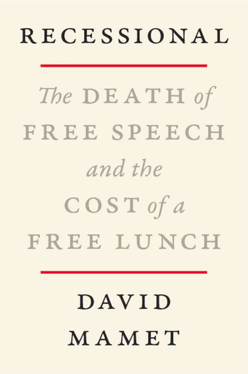Recessional
The Death of Free Speech and the Cost of a Free Lunch

Non-politicians like David Mamet, who’ve done a hard pivot from one political extreme to the other, fascinate me. In an effort to understand his mindset, I picked up Recessional.
Mamet’s a literate and engaging writer. Lines like, “I have sworn off the news because there is nothing new, and reiteration of the well-known and unfortunate serves no purpose other than as the bad narcotic of despair,” work as cynical poetry.
He also packs a mean wit. Consider his musing on the difference between stage and screen: “Edith Evans played Irina Arkadina in The Seagull on the West End in 1936. Her son Konstantin Gavrilovich stages his amateur play before her, his actress-mother. He finishes, and Chekhov indicates: A PAUSE.”
“Miss Evans paused, it is reported, for four minutes before she spoke, holding the audience immobile, waiting to see her reaction. One can’t do that in a film. (Although the French, it seems, won’t leave off trying.)”
But the book proves a tough read. It comprises a series of essays, written in 2020, amid the pandemic and published in National Review. Each runs only a few pages. The subjects vary, but the running theme is “The Left” are ruining the country.
I use quotes around “The Left” not to diminish Mamet’s choice of words, only to indicate I’m quoting him, as he’s never clear exactly who comprises “The Left”. Any Democrat? Anyone who didn’t vote for Trump? Anyone who doesn’t believe the 2020 election was “stolen”? This fascinated me in its own right.
Another surprise was Mamet’s penchant for conspiracy theories. He tosses off as fact that Dorothy Kilgallen died “from an overdose of ‘You got too close,’” to the Kennedy assassination. Later, he insinuates COVID was a deliberate retaliation from China against President Trump to enable China to purchase large swaths of US commercial real-estate.
Less surprising was his tendency to ground his positions in Judeo-Christian religious tenets. His third paragraph begins with, “Those of a religious disposition know that our free will comes from God and that free will only means the power to choose.”
Indeed, Mamet’s essays veer closer to sermon than logical arguments. That makes sense. He’s a dramatist by trade. His first paragraph states, “My professional life has been dedicated to the depiction of conflict.”
Keeping that in mind, one still gets the sense Mamet is, above all, angry. I doubt this is a new disposition. Some folks are born that way. With that in mind, his political shift makes more sense. The parties are as similar as they are different.
Consider how Mamet, in his essay entitled “Cause and Effect,” rails against how “the algebra of microaggressions allowed the weak to enjoy bullying the strong.” Rather than embrace the obvious (we’re all assholes if given enough power), he argues the strong must bully the weak, as that instructs us in “a reverence for God, for the country, for the family, for human life, for personal property.” If he didn’t actually believe this, it would make for satire on par with Dr. Strangelove’s “Gentlemen, you can’t fight in here! This is the War Room.”
Or how he rails against cancel culture and social justice, but when he raises the House Un-American Activities Committee and how it “ruined lives by searching for Communist propaganda in mid-century entertainment,” he avoids mentioning the committee’s conservative backing.
A shame, because he backs into a sound argument that today’s climate forces one to either publicly agree with certain ideologies or face retaliation, akin to either “naming names” and saving their livelihood or remaining silent and facing blacklisting. Not too far a step from the Salem Witch Trials (another conservative movement). The sides may have changed, but the behavior remains the same.
Political leanings aside, his acerbic observations on Hollywood shine. On the subject of TV, he writes, “The content of television shows is essentially undifferentiated. Not only are all the cop shows interchangeable; they are interchangeable with the medical shows. (Swap out the shoot-outs and the ER scenes—the action sequences—and they are all just bad narration about offscreen characters.)”
I’m going to peruse Mamet’s bibliography to see if he has an all-Hollywood book, as I suspect that would prove enjoyable. But I cannot recommend Recessional. Those who enjoy it are likely just as angry as Mamet, and—I suspect—will remain so, no matter the country’s politics.
But for those in the middle seeking to understand one side’s rage, Mamet’s work can prove illuminating. To ignore or dismiss his concerns is as foolhardy as embracing them. He is a man who loves this country and the opportunities it afforded him. He’s seeking to preserve and not destroy.
But progress always involves some destruction. To make progress, we must find common ground, and that begins with understanding. Mamet’s literate writing articulates his anger in a more digestible manner than a tweet or sound bite. I hope those that read it come away wiser, but hopefully not convinced.
Reading History
- 2024Aug25SunEbook
Read over 24 Days
- 2 Aug 202417%
- 3 Aug 202432%
- 4 Aug 202443%
- 5 Aug 202448%
- 6 Aug 202459%
- 7 Aug 202468%
- 9 Aug 202474%
- 18 Aug 202480%
- 25 Aug 2024Finished